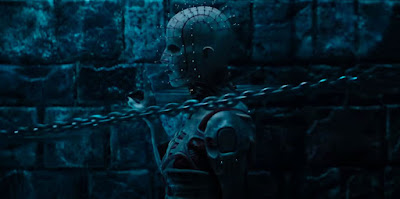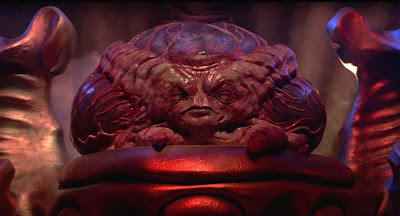I wish The Black Phone (2022, directed by Scott Derrickson) had the same ferocity as Sinister, the director's last horror movie. That film hinted at awful things for its whole length and then made good on those awful things in a way that was not reassuring for the audience as they filed to the exits. The Black Phone hints at awful things, too, but an alert viewer will realize that this is a different kind of dark fantasy film, one where the powerless must find power in themselves to overcome the monster. It's a Twilight-zoney film in which the whispers of other worlds are in contrast with the horrors of the mundane, but it's one that's reassuring in the end in a way that Sinister was not. I don't think I'm giving anything away with this, given the premise and structure of the film. It's a tense suspense film through its entire length, but it's only very occasionally scary.
"The fool, the meddling idiot! As though her ape's brain
could contain the secrets of the Krell!"
Made by a human being. AI is the death of culture.
Pages
Monday, October 31, 2022
Monday, October 24, 2022
When the Autumn Moon is Bright...
Every time I revisit The Wolf Man (1941, directed by George Waggner), I envision screenwriter Curt Siodmak upon writing the werewolf's rhyme leaning back in his chair and lighting up a big cigar. He was awfully proud of that bit of doggerel (if you'll pardon the pun). So much so that he puts it in the mouth of seemingly every character poor doomed Larry Talbot meets in the first half of the film. You know the one, right? "Even a man who is pure of heart and says his prayers by night, may turn into a wolf when the wolfsbane blooms and the autumn moon is bright?" You can't miss it. They repeat it for emphasis in the mouths of multiple characters.
The great flowering of horror movies during the early 1930s were seriously curtailed by the ascendance of the production code in 1934. Some of the films from the era went into vaults because they could not comply with the code (Freaks was unseen for 30 years), while others were cut into compliance on re-release, sometimes to the point of defanging them. King Kong survived the cuts well enough. Frankenstein perhaps less successfully (cuts demanded by the Kansas board of censors would have removed over half of the movie). James Whale famously foxed the censors while making The Bride of Frankenstein, complying with the letter of the code but not the spirit. After the Bride, horror movies began to fade, but Universal never forgot the mountain of cash its first wave of horror movies had amassed. And if they had, they were reminded when an LA theater booked a double feature of Dracula and Frankenstein in late 1938 to record crowds. That double feature spread throughout the country and its returns dwarfed the original box office of either film. Suddenly, Universal was back in the monster business. Son of Frankenstein was a success, so the powers that be wanted a new monster to add to the roster, and a new star to play him. They chose Creighton Chaney to be that actor, in part because his father was Lon Chaney, a name with which they could still conjure. They billed Creighton as Lon Chaney, Jr. and improvised a werewolf story around him. The result was The Wolf Man. It wasn't the first werewolf story Universal made--that would be The Werewolf of London six years earlier--but it's the one that assumed a place in the pantheon of the Universal monsters.
Friday, October 21, 2022
You Inherit the Flames
Daddy worked his whole life for nothing but the pain
Now he walks these empty rooms looking for something to blame
But you inherit the sins, you inherit the flames
--Bruce Springsteen, Adam Raised a Cain
I don't know if Clive Barker was ever a Catholic, but if he wasn't, he sure expresses some of the baggage of Catholicism. The idea that the slightest slip from the path of righteousness, even if you don't know you've slipped or don't know the rules, will land you in eternal damnation is a thread that runs through Barker's The Hellbound Heart even without the trappings of the church. Barker transmits this theme to the Hellraiser movies more or less intact, though films subsequent to the first two Hellraisers are less rigorous in their exploration of this idea, if they're aware of it at all. There's a queer layer to this, given Barker's sexuality and, um, colorful history working at gay leather clubs in the 1970s. His Goth-bondage demons seem tailored to a queer man's self-loathing, where his demons flog not only himself for his deviance, but everyone around him. Sin, it seems, has collateral damage.
The new version of Hellraiser (2022, directed by David Bruckner) has a different set of sins and a different source of self-loathing for its protagonist, but the idea is largely the same. In the Hellraiser universe's framing, basic needs when taken to extremes will land you in hell, whether it's a need for kinky gay sex or for pharmaceutical kicks. All human needs are addictions of a sort. The sins committed by Hellraiser's explorers of the frontiers of experience are a stand-in for any "sin" you like, however small and trivial. The fallout for the people around an addict is usually more dire than for the people around a self-loathing gay leather boy. So, sure. Why not. But there's a downside to this idea. It takes a property that, for all its flaws, originated as outsider art and frames it as mainstream product. Addiction narratives are mainstream films--everyone in Hollywood makes addiction movies eventually. All queer films, even today, are outsider art. You see the dichotomy, right? And this transcends the relative production values and even the competence of the filmmaking. This film has the most technically competent director who ever came near the series not excluding Barker himself, and production resources that dwarf any previous edition, and yet this fails to pull itself away from its progenitors.
Friday, October 14, 2022
Bride and Doom
[•REC]3: Genesis (2012, directed by Paco Plaza) makes the same "mistake" committed by Halloween III: The Season of the Witch all those years ago: it departs from the tried and true form of a beloved franchise in order to create something new and different. This entry isn't the same variety of grim and apocalyptic one finds in its predecessors. Moreover, it departs from the series' found footage aesthetic after a lengthy prologue, and then has the gall to have a sense of its own absurdity. It laughs at itself. To an audience expecting more of the same from this series, I'm sure it was a disappointment. Me? I kinda dig it. There's something about watching a wedding go off the rails that appeals to me. I'm a hopeless romantic, sometimes.
Monday, October 10, 2022
Sunglasses at Night
I told a friend that Dario Argento's new film, Dark Glasses (2022) strikes me as what you might get if you fed his old film, Cat O' Nine Tails, into an AI filmmaking engine. It would be equally soulless, but maybe that's being unkind. Dark Glasses isn't the same kind of car wreck Argento was making when last we met. Whatever the new film's deficiencies, it is an absolute baller in comparison to his Dracula. Faint praise, I know. For a brief period at the start, I thought the Argento of the early 1970s was behind the camera. The opening sequence is creepier and more suggestive of a world out of joint than the entirety of the director's output this century. But it was not to be...
Friday, October 07, 2022
Childhood Trauma
In retrospect, Tobe Hooper probably should have walked away from Cannon Films and Menahem Golan and Yoram Globus after the debacle of Lifeforce. Hooper still had cache after directing Poltergeist for Steven Spielberg, and the lingering reputation from the The Texas Chain Saw Massacre, but his three pictures for Cannon were career killers. Cannon had a reputation for producing schlock while over-promising on the quality of their films and one has to wonder if that had something to do with the reception for the remake for Invaders from Mars (1986). There was a staggering amount of talent associated with this film, including Hooper, cinematographer Daniel Pearl, screenwriter Dan O'Bannon, special effects masters John Dykstra and Stan Winston, and a cast of familiar faces, even if there were no big, big stars. And the film itself? It's better than I remembered it being. Mind you, I didn't really understand this film when I first saw it when it was in movie theaters. I hadn't seen the original film as a kid, so I didn't feel its wavelength as a children's movie. Nor did I recognize how thoroughly it reconstructed the original film for the 1980s. I did have the feeling that it was a poisoned fruit from a poisoned tree, which is perhaps not really true.
Tuesday, October 04, 2022
Sins of the Fathers
"Henry, your sovereign, Is prisoner to the foe; his state usurp'd, His realm a slaughter-house, his subjects slain, His statutes cancell'd, and his treasure spent; And yonder is the wolf that makes this spoil" -- William Shakespeare, Henry VI part III
The Cursed (2021, directed by Sean Ellis) is a full-bore Gothic that seems more critical of wealth and power than is usual for the genre. I mean, speaking truth to power is baked into the form even going back to its earliest days, but rarely are Gothic works so explicit and up front with the sins that motivate their plots. Unlike more traditional Gothics, it doesn't conceal its sins behind a veil of plot. It is an inheritor of films like The Fog and The Nightingale in which the villains and their sins are laid bare. It turns the xenophobia of so much of the genre on its head, and shows us the true face of evil: rich white men protecting their stolen wealth from the peoples they stole it from. As such, this is a fantasy, because the villains in this movie get their just deserts. Maybe I'm just being cynical.
Sunday, October 02, 2022
Double Double Toil and Trouble
October is upon us again and that means horror movies and the October Horror Movie Challenge. The first film I watched was Underwater, which I wrote about when it was in theaters. This was the second.
I was a grown adult when the original Hocus Pocus came out in 1993 and I never had children of my own, so that film was never part of my childhood. I saw it on television one year and charitably decided that it wasn't for me. I wasn't really planning to watch the sequel, newly released to streaming, but it's had pretty good notices--something the original item never got--some of them from people I admire. So in the wee hours of the morning on the first day of October, I clicked play. Hocus Pocus 2 (2022, directed by Anne Fletcher) is considerably better than the first film, at least, as far as I can remember. It's been a while. As kid-friendly spooky shows go, I could get behind this one if I had little ones of my own. Even as a bitter middle-aged woman, I can see its charms. I'm inclined to Halloween candy more than is probably good for me.







